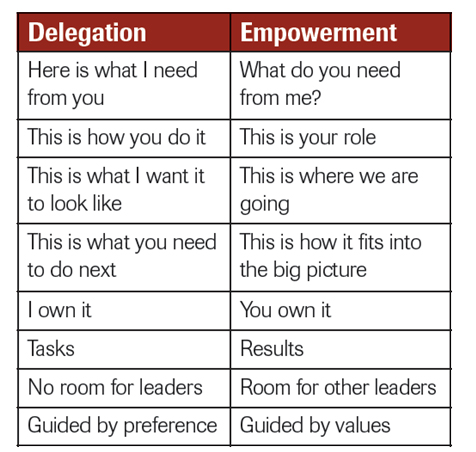While delegation involves giving an employee responsibility, empowerment involves passing of:
- Responsibility
- Accountability
- Authority to make decisions.
The manager retains overall control and accountability. The manager must ensure that an empowered employee has the correct preparation. Employees should know what they can and can't do. It is essential to address the skill/will ratio, investing in knowledge, skills and ability. An empowered employee should know what the business objectives and vision are. To truly empower, you must believe in your employee's ability.
As Stephen Covey, author of The 7 Habits Of Highly Effective People, said, 'An empowered organisation is one in which individuals have the knowledge, skill, desire and opportunity to personally succeed in a way that leads to collective organisational success.'

Source: The Unstuck Group (www.theunstuckgroup.com)
Empowerment involves setting the expectations and keeping a method of communication open when problems arise. Empowered employees should not be stifled by a lack of other colleagues' support and the manager must ensure that this does not happen. In a pharmacy the manager must make the right decision between delegating responsibility and empowering an employee. The key difference is that an empowered employee can make decisions without referring to the manager.
Activity
To delegate to, and empower employees, a pharmacy team must understand its business direction:
- Identify the top two to three key priorities to achieve within the next 12 months
- What has to happen to achieve those priorities €“ create an action plan
- What resources do you need (skill, knowledge, investment, etc)?
- Considering the skill/will matrix assessment in activity one, what tasks and to whom can you delegate actions?
- Do you need to build skill and/or will to succeed? How will you do this?
